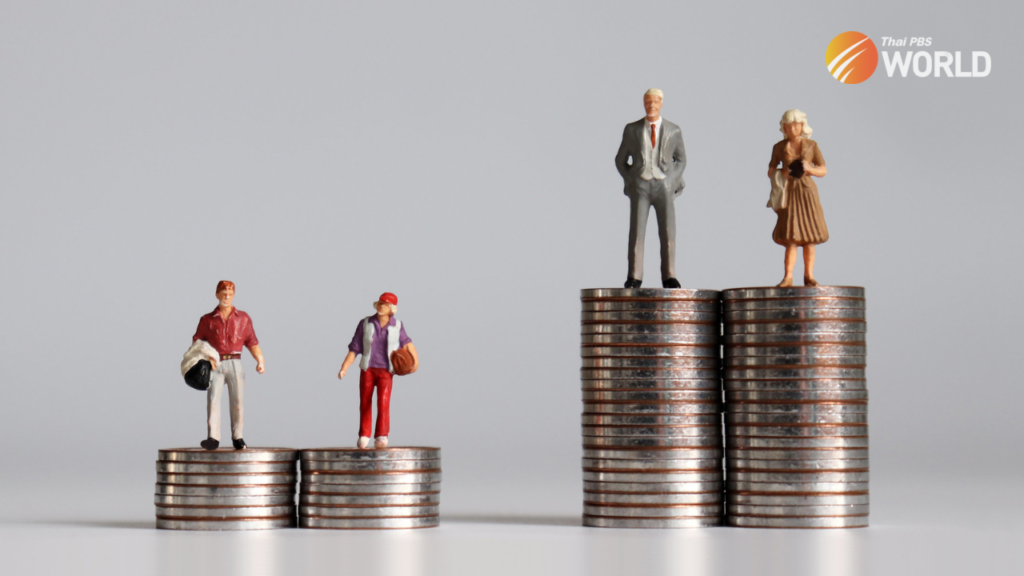Billionaires living in luxury penthouses, driving supercars, carrying designer bags, sipping cocktails on yachts and tossing dollar bills in the air are part of the general perception of what it means to be “rich.”
But defining “wealthy” for Thais is becoming increasingly difficult, especially when it comes to monthly income above 25,000 baht (about $690).
Who is meant by “rich”?
The definition of wealthy has been hotly debated on Thai social media recently, after a government subcommittee overseeing the digital wallet scheme began considering ways to exclude the “high net worth” from receiving the 10,000 baht payment from the government under the scheme.
Options include excluding those with a minimum monthly salary of 25,000 baht or who have total savings of more than 100,000 baht. Another option is to exclude those with a monthly salary of 50,000 baht or who have total savings of more than 500,000 baht. The committee also considered whether the scheme should be open only to national welfare card holders.
But Thais took to social media to express disbelief at the government's definition of “rich”, posting jokes about suddenly becoming wealthy on 25,000 baht a month.
So far, the government has not come to any conclusions about the digital wallet scheme, including the definition of “high net worth,” but what is certain is that 25,000 baht per month is the average salary of an office worker, as well as the minimum wage for new graduates working for large companies and those in high-demand occupations in the job market.
According to Adecco Thailand, a new graduate's monthly salary ranges from 12,000 to 40,000 baht depending on the industry they work in. Junior level staff with one to five years' experience can expect to earn 15,000 to 80,000 baht, while senior staff can earn 35,000 to 120,000 baht. Managers can earn 50,000 to 300,000 baht, and CEOs can earn 100,000 to 600,000 baht.
25,000 baht is relatively cheap considering the cost of living in cities, but it may seem expensive in rural areas. The cost of living in Thailand has skyrocketed, from public transport and fuel prices to everyday items, and the average salary cannot even cover the cost of living. The Thai government has vowed to reduce the cost of living for decades, but no one has been able to deliver.
Meanwhile, in purely economic terms, the Thailand Development Research Institute (TDRI) defines the “affluent” as those earning more than 40,000 baht a month, which represents less than 20 percent of Thailand's population.
The bigger problem
Let’s be honest, we’ve all dreamed of being rich at least once. And if we’re already “rich,” we want more. In Thailand, you’ll often see office workers and local villagers eagerly waiting for one.st And 16Number That's because the first of every month is when the national lottery draw takes place. The first prize is 6 million baht per ticket, enough to give aspiring millionaires a more comfortable life.
But the desire to be wealthy isn't just about becoming a billionaire or having a lavish lifestyle: in Thailand it also means the right to social privileges, better opportunities and even respect.
In fact, it is not hard not to notice that there is discrimination between the rich and the poor in Thai society and that they are treated differently.
Thai mainstream media also bears some of the blame. Soap operas, in particular, often flaunt wealth in all its facets, with characters living in mansions, being socialites, top executives, or simply being “rich.” At the same time, they also portray the horrific truth of living in poverty, such as living in a small house that floods on rainy days or being physically abused by mafia figures for not paying their debts on time. This simply reinforces the view that getting rich is the only path to freedom and happiness, even if it means giving up some dignity.
What is being told in the mass media is only a small part of the problem. The bigger problem is inequality, which stems primarily from Thailand's economic structure that allows such extreme inequality to persist, including the enrichment of certain groups of people through corruption, monopolies and political cronyism.
Many in the poorest sector of Thai society are already struggling to make ends meet, but lack access to social security, quality education, or even financial assistance to pay off inherited debts. Most people, especially the wealthy, are unaware of this. Not understanding the problem leads them to repeat their belief that anyone can become as wealthy as them, and to naively or selfishly assume that the poor are just people who don't work hard enough.
The government must find a clear definition
If we want to close the inequality gap, cash transfers may not be the best way. TDRI recommends that the government should place more emphasis on investing in infrastructure, healthcare, and education, as these have a greater long-term impact on the Thai economy than one-off transfers like the digital wallet scheme. At the same time, the government should provide more inclusive employment opportunities, including upskilling and retraining, improved social protection, and better access to quality education.
Even if governments prioritize reducing the economic burden on their citizens, and whatever the incentives, they must clearly define who is “rich” and who is “poor,” because these definitions are still highly subjective.
Nad Bunnag, Thai PBS World

